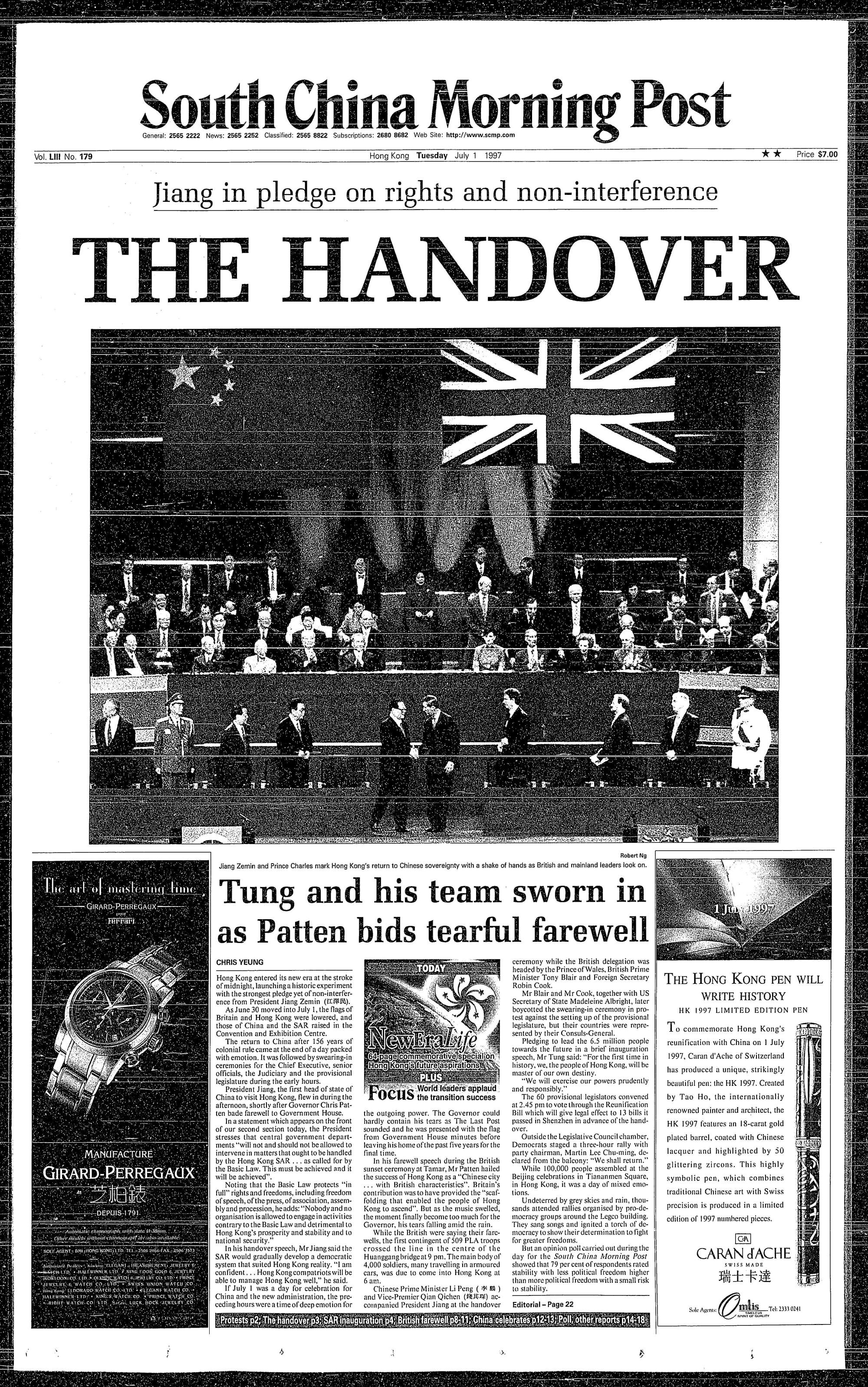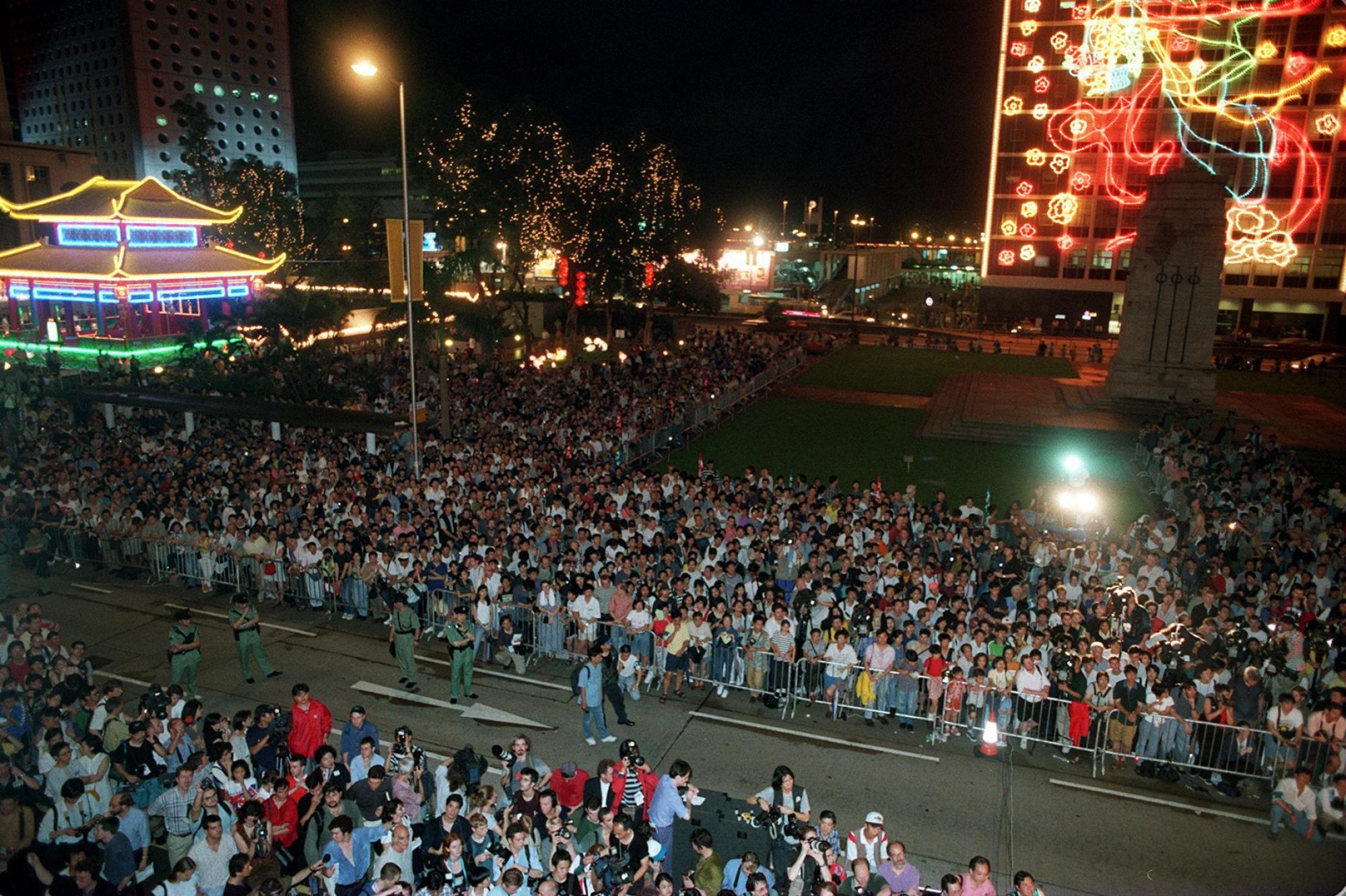
July 1, 1997: ‘The Handover’ - Hong Kong’s return to China after British rule
- Jiang in pledge on rights and non-interference
- Tung and his team sworn in as Patten bids tearful farewell
By Chris Yeung
Hong Kong entered its new era at the stroke of midnight, launching a historic experiment with the strongest pledge yet of non-interference from President Jiang Zemin.
As June 30 moved into July 1, the flags of Britain and Hong Kong were lowered, and those of China and the Special Administrative Region raised in the Convention and Exhibition Centre.
The return to China after 156 years of colonial rule came at the end of a day packed with emotion. It was followed by swearing-in ceremonies for the Chief Executive, his senior officials, the Judiciary and the provisional legislature during the early hours.
Mr Jiang, the first head of state of China to visit Hong Kong, flew in during the afternoon, shortly after Governor Chris Patten bade farewell to Government House.

In a statement which appears on the front of our second section today, Mr Jiang stresses that central government departments “will not and should not be allowed to intervene in matters that ought to be handled by the Hong Kong SAR . . . as called for by the Basic Law. This must be achieved and it will be achieved”.
Noting that the Basic Law protects “in full” rights and freedoms, including freedom of speech, of the press, of association, assembly and procession, he adds: “Nobody and no organisation is allowed to engage in activities contrary to the Basic Law and detrimental to Hong Kong’s prosperity and stability and to national security.”
In his handover speech, Mr Jiang said the SAR would gradually develop a democratic system that suited Hong Kong reality. “I am confident . . . Hong Kong compatriots will be able to manage Hong Kong well,” he said.
But if July 1 was a day for celebration for China and the new administration, the preceding hours were a time of equally deep sentiment for the outgoing power, and its principal representative here since 1992.

The Governor could hardly contain his tears as a military bugler sounded The Last Post and he was presented with the flag from Government House minutes before leaving his home of the past five years.
In his farewell speech during the British sunset ceremony at Tamar, Mr Patten hailed the success of Hong Kong as a “Chinese city . . . with British characteristics”. Britain’s contribution was to have provided the “scaffolding that enabled the people of Hong Kong to ascend”.
However, as the music swelled, the emotion of the day finally became too much for the man who brought democracy to Hong Kong. Hunched forward in his seat, head in hands, his tears fell with the rain.
As the British said their farewells, the first contingent of 509 PLA troops crossed the line on the Huanggang bridge at 9 pm. The main body of 4,000 soldiers, with armoured cars, was due in Hong Kong at 6 am.

Prime Minister Li Peng and Vice-Premier Qian Qichen accompanied Mr Jiang at the handover while the British delegation was headed by the Prince of Wales, Prime Minister Tony Blair and Foreign Secretary Robin Cook.
Mr Blair and Mr Cook, together with US Secretary of State Madeleine Albright, later boycotted the swearing-in ceremony in protest against the setting up of the provisional legislature, but their countries were represented by their consuls-general.
Pledging to lead the 6.5 million people towards the future in a brief inauguration speech, Mr Tung said: “For the first time in history, we, the people of Hong Kong, will be masters of our own destiny. We will exercise our powers prudently and responsibly.”
The 59 provisional legislators voted through the Reunification Bill at the end of an hour-long session to give legal effect to 13 bills passed in Shenzhen before the handover.

Outside the Legislative Council chamber, Democrats staged a three-hour rally with party chairman Martin Lee Chu-ming declaring from the balcony: “We shall return.”
While 100,000 people celebrated in Tiananmen Square, it was a day of mixed emotions here in Hong Kong. Undeterred by grey skies and rain, more than 1,000 people attended rallies organised by pro-democracy groups around the Legco building. They sang songs and ignited a torch of democracy to show their determination to fight for greater freedoms.
But an opinion poll carried out during the day for the South China Morning Post showed that 79 per cent of respondents rated stability with less political freedom higher than more political freedom with a small risk to stability.

